Stories
Beirut blast one year on: "We are resilient. We are strong. We want to open our business and we want to stay in Lebanon".
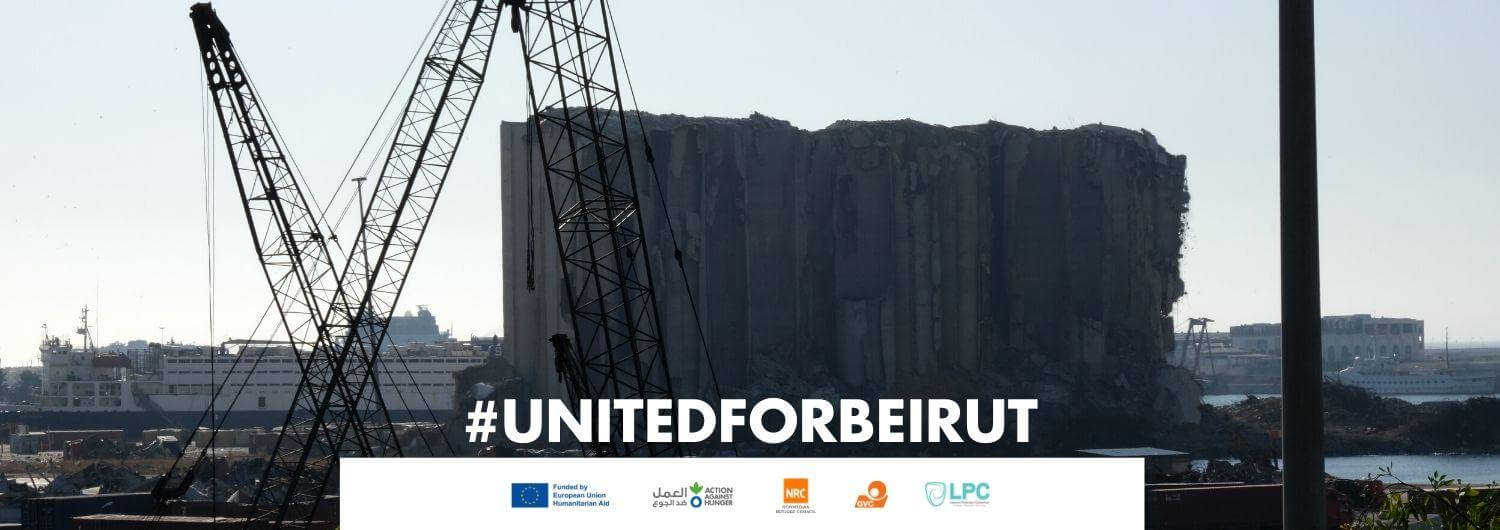
One year has passed since the blast in Beirut habour. (Photo: Zaynab Mayladan for NRC) #UnitedforBeirut
Barely one year has passed since a large concentration of ammonium nitrate exploded in the Beirut port, killing over 200, injuring over 6,000 and severely damaging not only the homes and businesses of estimated 250 000 people but also their hope. In a country already affected by a dire economic crisis and a volatile social context further exacerbated by the COVID-19 pandemic, the explosion on the 4th of August 2020, led to a significant increase in the immediate and long-term humanitarian needs thus aggravating poverty and inequality. Indeed, more than half the population is below the national poverty line now according to the World Bank, declaring Lebanon’s predicament to be one of the most severe global crises episodes since the mid-nineteenth century.
BEYOND THE HUMAN TRAGEDY, MANY HOUSES AND BUSINESS WERE AFFECTED
The infrastructural damages left homes and businesses totally or partially destroyed in important residential and commercial areas such as Mar Mikhail, Karantina, Gemmayzeh, Geitawi, Qoubayat and Bourj Hammoud, including goods, supplies and equipment. Consequently, many people directly lost their homes and their jobs or were unable to work because of their injuries, with direct implications for their households.
“When the blast happened, I was at home. I had a shift at the hospital, I did not go because all my house and family-in-law’s house were damaged. My husband’s feet were injured, doctors wanted to amputate it.” Suzanne remembers. She used to work as a nurse until the disaster happened while her husband managed a small bakery that she inherited from her father. During the explosions, he got injured and was therefore unable to work anymore, forcing Suzanne to leave her job and take care of the business herself as their only income.
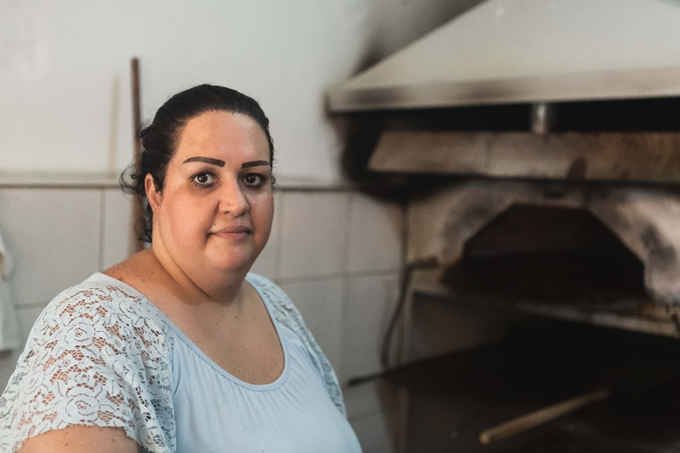 Suzanne is a 42-year-old nurse who works now in the bakery she inherited from her father after the blast destroyed it and injured her husband. (Photo: Carmen Moreno for Action againts Hunger)
Suzanne is a 42-year-old nurse who works now in the bakery she inherited from her father after the blast destroyed it and injured her husband. (Photo: Carmen Moreno for Action againts Hunger)
“There was nothing left: no doors, no machines, no walls, no slabs. The day before I bought materials for LBP 4,800,000, everything was damaged. I only came to see the shop the third day because I feared what I would see. It was enough to see my house and family-in-law’s house damaged.”
 Suzanne rules the business on her own and manages two employees including Mahmoud in the picture. (Photo: Carmen Moreno for Action againts Hunger)
Suzanne rules the business on her own and manages two employees including Mahmoud in the picture. (Photo: Carmen Moreno for Action againts Hunger)
CASH ASSISTANCE AND LEGAL AID AS TIMELY, DIGNIFIED AND APPROPRIATE STRATEGIES TO BOOST RESILIENCE
Amid all the chaos, the Lebanon Protection Consortium (LPC) comprised of Action Against Hunger Lebanon (AAH), the Norwegian Refugee Council (NRC) and Gruppo di Volontariato Civile (GVC) provided a joint intervention to effectively address different types of needs resulting from the Beirut Blast as well as increase safety and protection. This complementary approach was aiming at supporting households to solve legal issues and to rebuild their livelihood activities while promoting resilience and autonomy.
Most of the survivors assisted, managed to rebuild their homes and businesses thanks to the kind support of EU Humanitarian Aid. One year later, there is a general feeling of recovery although their needs remain high.
CASH GRANTS TO STRENGHTEN SURVIVORS’ LIVELIHOODS
Micro, Small and Medium Enterprises (MSMEs) comprise over 97% of the total private enterprises in Lebanon and employ over 50% of the total workforce. Therefore, Action Against Hunger Lebanon’s response focused on supporting 39 MSMEs through cash assistance and professional coaching; 13 of them were female owned. Trainings provided were promoting income generation and more profitability by addressing issues related to lack of liquidity, decreased purchasing power, and limitations to their ability to supply goods and services. The objective was to both meet the owners most urgent needs and help regain their autonomy in the mid-term in a flexible and dignified manner by involving their owners in the action while stimulating the local market and economy.
This was the case for Jerard, a cobbler who saw his shop and family’s only source of income destroyed. “Without you (AAH support), maybe we couldn’t have reopened the shop, maybe it would have still been damaged. Without assistance, we can do nothing in these days, especially financially. Now with our work, slowly, slowly, we can restart living normally”, Jerard explains.
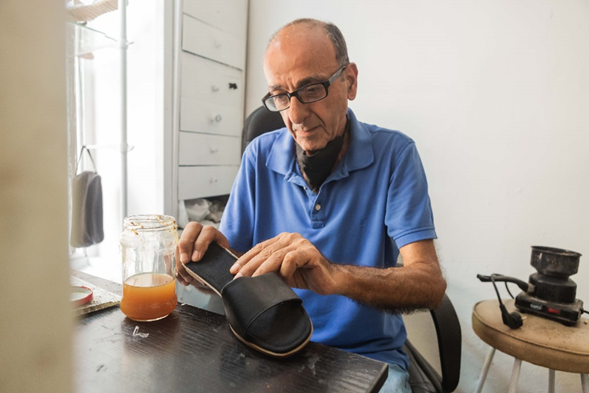 Jerard is a 75-year-old cobbler who repairs shoes in his shop, severely damaged by the blast. (Photo: Carmen Moreno for Action against Hunger Lebanon)
Jerard is a 75-year-old cobbler who repairs shoes in his shop, severely damaged by the blast. (Photo: Carmen Moreno for Action against Hunger Lebanon)
“We are resilient, we are strong, we want to open our businesses and we want to stay in Lebanon, if the Lord wills it, we will not leave the country. This is our goal.” Not only did the program allow him to rehabilitate the space and acquire new equipment to continue repairing shoes but also enabled him to upgrade his business. Thanks to the assistance, he now sells new brand footwear and accessories too. The success of his recovery helps him to stay and contribute to the economy of his home country.
COUNSELLING AND LEGAL ASSISTANCE ON HOUSING, LAND AND PROPERTY RIGHTS
The Norwegian Refugee Council expanded its existing legal aid programme to support the housing emergency response to the Beirut Blast with information, counselling and legal assistance provision on Housing, Land and Property (HLP) rights. This includes the verification of property ownership titles, tenancy agreements and collaborative dispute resolution between property owners and tenants in case of eviction threats.
 NRC teams assessing the damage in the neighbourhoods affected by the Beirut explosions. (Photo: Zaynab Mayladan for NRC)
NRC teams assessing the damage in the neighbourhoods affected by the Beirut explosions. (Photo: Zaynab Mayladan for NRC)
The Norwegian Refugee Council helped repair the damage of Hayat’s house —a Syrian refugee whose husband used to work in the port and lost his job after the explosion— and mediated between the family and the landlord when the latter threatened to evict them because they were no longer able to pay the house rent. Nevertheless, they are facing new challenges since Hayat’s husband sustained an injury to his hand during the blast, which limits his ability to find a work. As a result, the family now relies on aid from humanitarian organisations to survive. “We could easily provide food before the explosion, but now we can’t eat meat anymore, everything is expensive. What are our options?”, Hayat worries. Hayat fears that, without support from aid organisations, she, her two daughters and her husband, may end up being homeless.
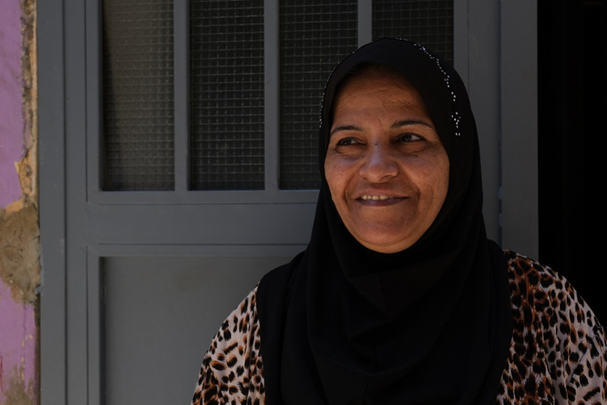
Hayat is a 56-year-old Syrian refugee living in Mar Mikhail, a Beirut neighbourhood that was heavily affected by the port explosions. (Photo: Zaynab Mayladan para NRC)
Even though the households supported by the LPC intervention improved their situation by helping them to regain a safe shelter and needed income, they are still facing great difficulties. Like Hayat, many survivors don’t even get any earnings and only rely on humanitarian aid to make their ends meet since the Lebanese lira keeps losing value and the prices continue increasing.
BASIC NEEDS REMAIN AT A DISTURBINGLY HIGH LEVEL DUE TO THE WORSENING MULTICRISIS
The impact of the current monetary and financial turmoil in Lebanon is affecting most public services, and a previously cheap, subsided fuel is not only far more expensive now but also the stations are suffering from massive shortages that prevent businesses from receiving the supplies they need.
“There is no fuel. Usually, suppliers deliver the product to us. Now they are saying there is no fuel, so they stopped the deliveries. The only way for me to get products is to pay a taxi to bring the products. It is the new problem of all the country.” Haigohi owns a small grocery shop that was severely damaged, including the loss of most of the products she had for sale. Her husband, Awediss, has special needs that were worsened by the blast, so she is the only one in charge of the business as their sole source of income.
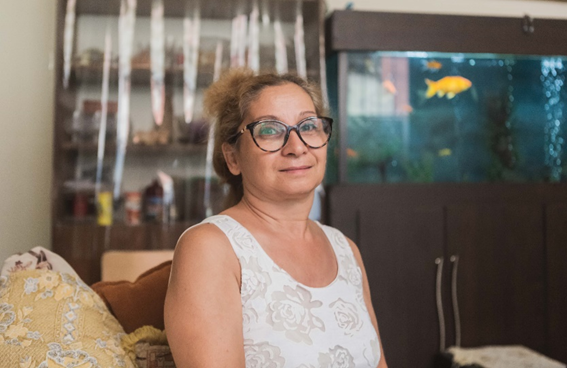
Haigohi in her home. She is a 57-year-old woman that owns a groceries shop as her family’s only source of income. (Photo: Carmen Moreno for Action Against Hunger Lebanon)
She rebuilt the shop and got new items with the assistance provided by AAH, but even still having some money left, Haigohi is unable to use it to get more products. “If only you (AAH) knew people who can help me with the delivery of the products just to fill the shop so as I can live from it… This is for now the only remaining problem. I only have the cash assistance to buy products, nothing else.”
THE CHALLENGE OF THE RECONSTRUCTION IS STILL GOING ON
Like Haigohi, all people in Lebanon are living in a worrying state of uncertainty that hits every aspect of their life since they confront new obstacles on a daily basis. Similar aid initiatives based on a pro-resilience approach are therefore needed and could be extrapolated to other sectors to address the different needs on a long-term perspective.
Despite all the difficulties, Haigohi stays positive: “When AAH arrived, I was able to really reopen the shop in a stronger way. I want to be stronger. We only have this shop, so we will work until God allow us to do it.”
This is the evidence that there is still hope, that with a combination of humanitarian response and structural support aimed to target multisectoral needs, people in Lebanon will be able to resume their live and support their own communities.
JOIN US
Donate now
Your donation will reach those who most need it
Become a member
Join the generation that can bring an end to hunger
Donate via SMS
send HAMBRE to:
- 28010(1.2€)
- 38010(6€)
- 38012(3€)
Full donation to our projects. Valid for Movistar, Vodafone, Orange and Yoigo